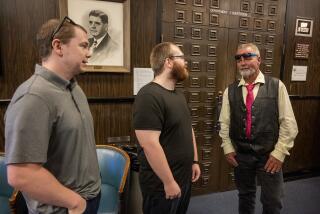Can’t Forget Slain Family, Ex-Green Beret Doctor Says
RICHMOND, Va. — Former Green Beret doctor Jeffrey MacDonald, awaiting a decision on his murder appeal, said in a published interview Sunday that it is a “rare day” he does not think of his slain family.
MacDonald, convicted of killing his pregnant wife Colette, 26, and daughters Kimberly, 5, and Kristen, 2, made his comments in a telephone interview with the Richmond Times-Dispatch from the Federal Correctional Center in Bastrop, Tex.
MacDonald, who lived in Huntington Beach and worked as head of emergency services at St. Mary’s Medical Center in Long Beach before his trial and again while free on appeal, said he cannot forget as he enters middle age that his daughters would be young women now.
‘I Feel Terrible’
“It’s awful,” he said. “I have fair days now but it’s a rare day I don’t think about them. Little anecdotes come to mind. On birthdays or anniversaries, I feel terrible.
“I get a lot of mail from college and high school kids who say, do I realize they’re the age of my daughters?
“It’s very stunning, riveting. It takes your breath away for a while.”
MacDonald, who contended his family was slain by drug-crazed hippies, was first charged by the Army in 1970 for the deaths at Ft. Bragg, N.C.
He was honorably discharged after the allegations were initially declared untrue. But the Justice Department continued the inquiry, leading to his conviction in 1979. The case was the subject of last fall’s TV movie, “Fatal Vision.”
MacDonald argued the second trial--in the U.S. District Court in Raleigh, N.C.--was double jeopardy and unsuccessfully appealed to the Supreme Court.
New Information
The latest appeal, to the U.S. 4th Circuit Court of Appeals in Richmond, suggests there is new information that should have required U.S. District Judge Franklin Dupree not to hear the case.
MacDonald’s lawyers said Dupree should have disqualified himself because his son-in-law was the former prosecutor who directed the government’s early investigation into the killings.
“You start thinking, wondering, what is going on here?” MacDonald said. “Am I the decent person I think I am? Then you have to fight the humiliation and shame and the psychological thing of not having defended your family.”
More to Read
Sign up for Essential California
The most important California stories and recommendations in your inbox every morning.
You may occasionally receive promotional content from the Los Angeles Times.










